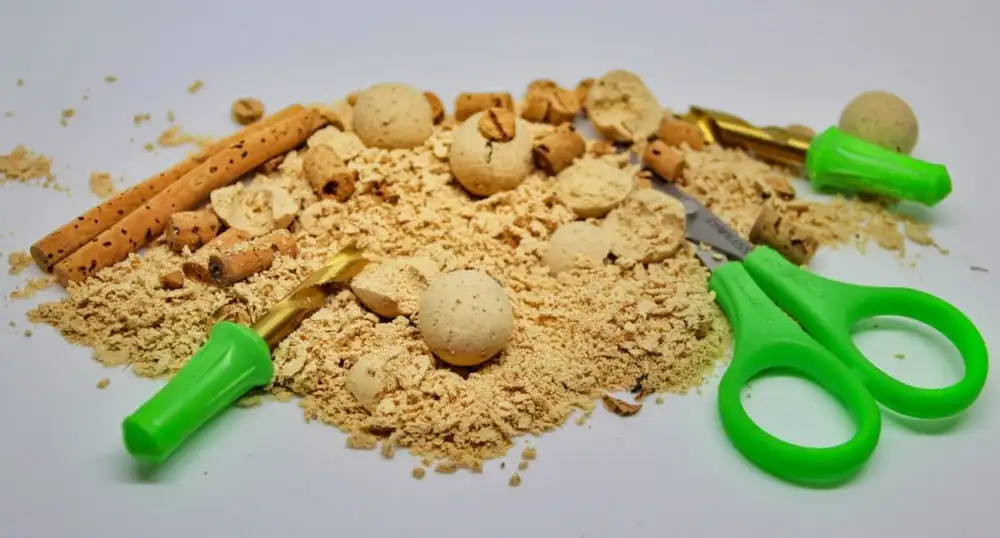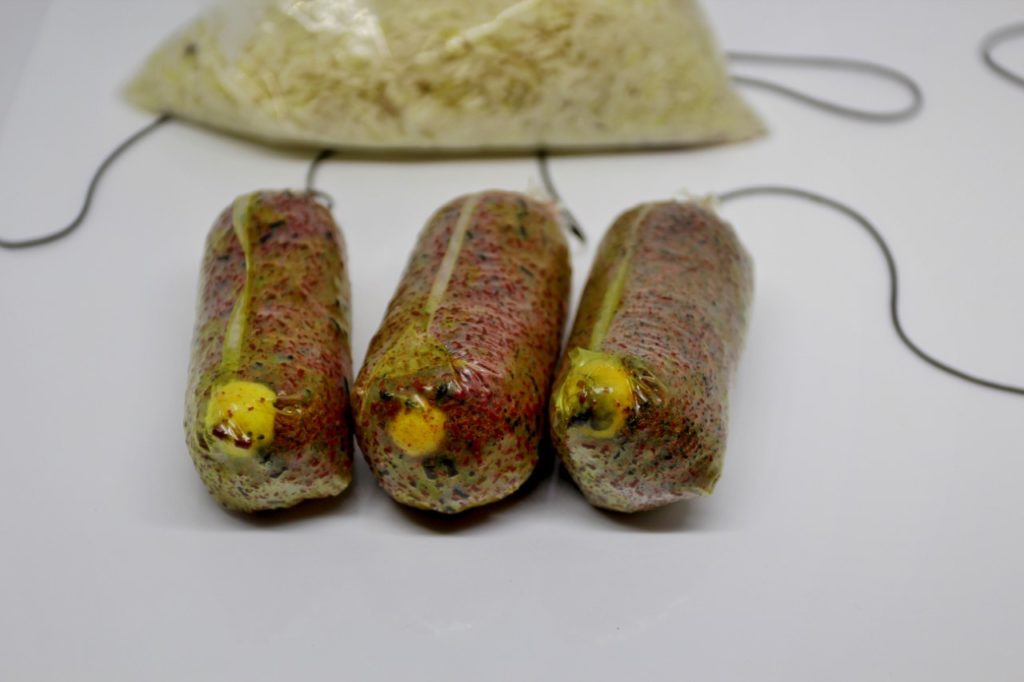This is a demo store. No orders will be fulfilled.
Arezue Wright- Cold Water and Winter tactics

Whilst fishing in the colder months can be more difficult it doesn’t have to be and with it being quieter on the banks with less lines in the water, putting that extra effort in and being just a little more resilient than others can more often than not assist you in your pursuit.
Here’s a few pointers that will hopefully help you bag that cold water whacker.
Dress For The Occasion
There’s no point in complaining about being uncomfortable once you’re on the bank. Ensure that if you are venturing out in cold and wet conditions you have suitable clothing and if possible, ensure that you have a spare set in your barrow bag or in the boot of your car.
So what do you need? Obviously, a nice warm outer coat is a must and preferably one that is waterproof and hooded ensuring that those biting northerly winds are kept at bay.
Secondly, invest in some quality footwear, some that will not only keep your feet dry but also warm. There is nothing worse than having cold feet as once they get cold it’s very hard to warm them up and for me once my toes are frozen it’s game over!
Thermal socks and base level clothing are a must in cold weather and for the same reasons as above I always ensure I have a few pairs of extra socks with me should I perhaps forget to don my boots in the middle of the night whilst exiting my bivvy to pick up that screaming take.
We’ve all done it, there’s nothing worse than having to crawl back into your sleeping bag with wet feet.
Lastly, one that has been an absolute life saver on the coldest of nights has to be my trusty hot water bottle! It makes the difference between quitting and staying and there’s no shame in having one even for the biggest and toughest of us out there, after all it’s about being comfortable whilst we’re fishing and it’s not a test of endurance for all those bankside hero’s out there.
Power Up
As the clocks go back, 12-14 hour nights become a reality and can seem like a lifetime when you’re snuggled up in your bag waiting for your alarms to burst into life.
Again it’s all about being comfortable, ensure you have a reliable power pack or spare sets of batteries for all those bankside gizmos and gadgets, such as lights, head torches, mobile phones and cameras, there’s nothing worse than having a power drain or having to fumble around in the dark because your head torch died or your forgot to pack a spare set of batteries for your bivvy lights and god forbid you bag a whacker in the middle of the night only for your camera to be dead because you forgot to charge it. Failing to prepare is preparing to fail.
Warm Your Insides
Plenty of hot drinks is my motto so whether you’re a tea or coffee drinker make sure your brewing rations are stocked up and in addition what better to warm your hands than to wrap them around a piping hot cup of your favourite bankside beverage.
Ensure you have a reliable stove and again a spare gas cylinder so that you can rustle up your favourite bankside grub to keep you warm from the inside.
One thing to note regarding gas is in cold temperatures dependent on the mix the cold can affect the performance on the fuel so get yourself a thermal gas cover to ensure you don’t get left out in the cold. Literally.
Pack yourself some trusty pots of instant porridge for those cold and frosty mornings, a few tins or even better some ready prepared homemade soup to warm your cockles throughout the day and then why not treat yourself to a hearty homemade stew in preparation for the onset of darkness and plummeting night time temperatures!
Home From Home
Having spent the warmer months sleeping under the stars or under a brolly it’s now time to dig out the trusty bivvy and wrap, especially if you’re planning on doing a couple of nights as the last thing you want is to wake up soaked in condensation, which is an all too common problem for single skin bivvies and brollies particularly in the colder months.
One step I do like to take every year is to reproof the bivvy and subsequent wrap with a universal waterproof protector. Not only will this prevent moisture and leaks through the material but also prolongs the life of your bivvy.
Location
Now more than ever is locating fish important. Carp are far less active in the colder months and simply observing and watching the water will help you locate and pin them down, don’t waste your time in a dead swim.
Not wanting to move around as much carp generally shoal up, so find one and generally you’ll find more.
Don’t overlook the shallows or back weedy bays on a sunny winter’s day and anywhere out of reach of a biting winter wind will usually hold a few fish. Look for our feathery friend diving over spots, as often this can indicate feeding over the last bloom of daphnia of the year or picking the last of the invertebrates from a dying weed bed. Find the birds and the fish won’t be too far behind.
The usual haunts such as snags or proven summer spots are always worth a revisit and a cast with a single to a showing fish is one tactic that should never be over looked, a method that has proven itself as an effective cold water slayer.
Lastly travel light and prepare to stay mobile, it’s no use sitting at one end of the lake when the only show you’ve seen all day is at the other end of the lake.
Short and Sweet

Long gone are the warm summer nights and extended daylight hours and so sitting behind motionless bobbins in the teeth of a cold northerly wind, waiting for the fish to come to you is neither pleasant or, in most cases, productive so why not adapt your approach to regular short sessions.
As aforementioned, fishing singles at this time of year can be a devastating tactic and flicking a bait out in front of as many fish as you can during the day will more often than not produce where other methods and a static approach are likely to fail.
My favourite colour boilie for winter has to be white! A critically balanced bait or snow man can be devastating.
Also don’t over look the ever faithful PVA bag. Again this can come into its own when fishing shorter sessions and with a glugged hook bait, nestling tightly in amongst your favourite bag mix what carp could resist as it continually pumps out food signals throughout the watery layers.
So that I’m fishing even more efficiently and to maximise my time spent fishing on the bank I like to make my PVA bags up the night before and to ensure they stay nice and dry and moisture free try storing them in a bucket or freezer bag of rice as there’s nothing worst than waking up to find an overnight frost or condensation has killed off a dozen PVA bags!
Sometimes shorter sessions and adopting a roving or mobile approach can also help you to identify feeding areas quickly and being mobile and travelling light for example a few hours before or after work will more often than not help you identify bite times. For me first light and an hour into darkness are the most productive.
Pin It Down
Winter down at the lake usually means increased water clarity, so don’t be surprised if you turn up and the margins are gin clear and you can see the bottom in five foot of water or more.
For these reasons rig and bait presentation or at least the last 6ft needs to be pinned down as the most inconspicuous rig will now stand out on the bottom like a sore thumb sending the carp run for the hills should they come across it.
To minimise detection as much as possible consider pinning everything down using a heavy tungsten tubing or leader where permitted along with a fast sinking hook link to match the bottom contours and colouration if possible.
For added anti detection opt for a clear fast-sinking mono line or Floro carbon to get everything from tip to tail nailed to the bottom and help you snare the wariest of cold water monsters.
Bait Selection

For most, come winter and into the colder months it has become fashionable and in some cases is surrounded by an age old debate as to the fact that fishmeal’s don’t work as well in winter due to having a high oil content and the fact that they are harder to digest in cold. Therefore we suddenly switch from fishmeal boilie to perhaps a bird food boilie or one that has a greater soluble content.
This as I say is a massive subject and has room for a great debate but for me I have found that fish meals are just as effective in the colder months as the warmer months and in recent years with the evolution of carp baits some fish meals now have a very low oil content making them just as efficient as their once considered more soluble counter parts.
For me an effective bait is one you have confidence in and always will be.
If you are considering making a change do it for the right reasons and maybe consider mixing two different boilies together, then if you really are convinced that you need to change a bait you’ve caught on all summer you formulate your findings based on catch results and fact and have a valid reason for doing so and not just because the bloke in the next peg says so! Baiting & Waiting
This is not a tactic that is available to all but where you have regular access to a water and pre baiting is allowed, baiting spots on a regular basis throughout the colder months can help you snare and draw in those extra bonus carp.
For me this is a time to break out a mixed particle and more often than not one which has high visibility properties such as corn or maize which the carp can hone in on.
As with everything a little and often approach is best as you can always put more in if the fish are clearing your spots but there’s no point in keep piling it in the margins time after time for it just to sit and rot on the bottom.
Particles are perfect for winter pre-baiting as the mixture of various food elements will keep the carp rooting round for hours.
If you’re successful in your approach and can be discreet you will be rewarded for your extra efforts, I can assure you of that.
Remember, winter fishing is about making the best of what you have in front of you and maximising opportunities.
Yes, winter fishing can be difficult but remember, above all to enjoy your time on the bank and at the end of the day you won’t catch them sat on the settee at home will you.